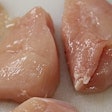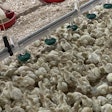A shrinking pool of knowledgeable, passionate, young people to take the reins of the industry is becoming a growing worry in feed business circles worldwide. Concern over sufficient lack of support for students pursuing PhDs in the animal sciences has many of today's leaders concerned.
But some companies are doing more than wringing their hands over the issue. Feed International has been speaking with a number of feed-related companies about their own efforts to address this issue. In the first in our series of spotlights on education in Feed International, we spoke with one of several companies taking a proactive approach: Novus International, based in St. Charles, Missouri, USA. The Novus Graduate Scholars (NGS) programme was develped to provide support to graduate students in a partnership with universities in China.
NGS participants are selected from top graduate students in animal and veterinary sciences departments at several partnering universities in China. Outstanding students receive scholarships in the form of monetary awards, which partially fund their needs.
Developing a network
The individual awards are provided every year by Novus at each university, followed by an industry-related seminar. The awards are targeted at research efforts where the company has an interest from among topics suggested by faculty members from cooperating universities or other technical professionals from Chinese companies.Novus' purpose is four-fold: encourage students in animal agriculture to develop strong research programmes and help them develop an international perspective of agriculture; learn more about the agriculture system in China; learn more about the university system, the professors and the students; and develop a network of technical collaborators in developing solutions for the challenges associated with animal agriculture in China. In addition to the NGS award, one student from each university is selected to participate in a summer internship outside of China.
Many will intern at Novus' Research Centre in the US and participate with other collaborators in the US and other countries. The first group of NGS interns "graduated" in August 2007. The interns were exposed to a variety of experiences from cultural to research and development in animal agriculture. Spokespersons for the scholars programme say it involved participation in the joint American Society of Dairy Science, American Society of Animal Science and Poultry Science meetings in San Antonio, Texas, as well as visits to a variety of industrial farming sites in the Midwest, including a 30,000 cow-dairy, a beef feedlot, commercial feed mills, and commercial sow and swine grow-finish operations. The interns also visited two universities, and met faculty, other Chinese interns and graduate students.
Feed International had the opportunity to catch up with Thad Simons, president and CEO of Novus International, to ask about that company's investment in education and its benefits.
Feed International: Why is Novus focusing on the Chinese feed industry? How was the decision made to start the programme in China versus elsewhere?
Thad Simons: We went into China only about six years ago, in sales. When we first came in, our product was well-known but Novus as a company was not. So, this programme has been beneficial to China as well as to us and we've had the opportunity to work with local universities and establish important relationships. Our sales force had found a need to build on our reputation and this was one approach. We asked ourselves, what can we do that can actually support our industry?
FI: Why a programme for graduate students?
Simons: We chose to go with graduate students because we knew they would be dedicated to pursuing a career in animal science. Undergrads may not pursue animal science as a career because a lot of times, students end up choosing different career paths. We knew that China was very open and excited about the opportunity of working with us.
FI: Why does Novus feel this is an investment worth making?
Simons: What comes back to us is the building of great relationships. We want to tie into relationships, tie into something more than just giving monetary support to a programme. We now have relationships with each of the faculty at these universities. The students will be a potential talent pool for new hires or may become potential customers. They may work for a competitor. Regardless, they at least know that Novus is a serious company and that we put value into a programme like this.
FI: Any thoughts about expanding your reach with similar efforts elsewhere?
Simons: In the next phase, we'll see how we can integrate programmes that we have in other countries, such as India, Korea, Vietnam and Africa. It's very hard for graduate students to get funding and really important to make sure we will have good, qualified people coming out of these programmes. In China, this programme raises expectations of us to keep it going and provide meaningful experiences to students. The challenge is for us to sustain that level of commitment.
Chris Knight, Novus' head of research and development, echoes Simons' belief that the programme is an important investment not only for Novus, but also for the broader industry. "Critical interaction with universities and faculty members is important to what we do. There are about 30 universities in the US we've worked with. How many of our technical people have a degree from one of those universities? At least half," says Knight.He says Novus began by doing product R&D in the US and then exporting the product to the world. But there is now a need to do local product development.
"We needed to get up to speed with what the industry is doing there, what the universities are doing. This programme helps us get jumpstarted with the process," says Knight.
As they wrap up their internships in the US, the scholars present a summary of their experience, highlighting what they have found most beneficial. Many note opportunities to work within specific species or gain laboratory experience. Others note the opportunity to improve their English.
"We come here and we have a terrific experience," summed up one intern.
.jpg?auto=format%2Ccompress&crop=faces&fit=crop&h=48&q=70&w=48)

















